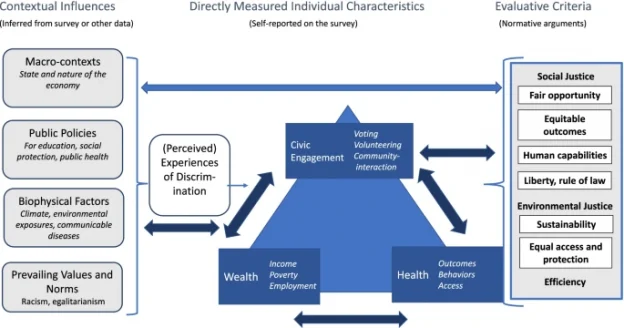- Facebook66
- Threads
- Bluesky
- Total 66
Newly published and open-access: Stopka, T.J., Feng, W., Corlin, L., King, E, Mistry, J. Mansfield, W, Wang, Y, Levine, P. & Allen, J. Assessing equity in health, wealth, and civic engagement: a nationally representative survey, United States, 2020. Int J Equity Health 21, 12 (2022). The abstract is below. The project website, with interactive tools for exploring the data, is here.
I am proud that our model includes “evaluative criteria” (normative principles) along with empirical information and causal arrows. One of my most basic beliefs is that these domains must be integrated in order to decide what to do in the world. I would acknowledge, however, that our approach is cross-sectional–it’s all about similarities and differences in the present. It therefore obscures historic injustices, which are central to many of our most important current debates about social justice.
Background
The principle of equity is fundamental to many current debates about social issues and plays an important role in community and individual health. Traditional research has focused on singular dimensions of equity (e.g., wealth), and often lacks a comprehensive perspective. The goal of this study was to assess relationships among three domains of equity, health, wealth, and civic engagement, in a nationally representative sample of U.S. residents.
Methods
We developed a conceptual framework to guide our inquiry of equity across health, wealth, and civic engagement constructs to generate a broad but nuanced understanding of equity. Through Ipsos’ KnowledgePanel service, we conducted a cross-sectional, online survey between May 29–June 20, 2020 designed to be representative of the adult U.S. population. Based on our conceptual framework, we assessed the population-weighted prevalence of health outcomes and behaviors, as well as measures of wealth and civic engagement. We linked individual-level data with population-level environmental and social context variables. Using structural equation modeling, we developed latent constructs for wealth and civic engagement, to assess associations with a measured health variable.
Results
We found that the distribution of sociodemographic, health, and wealth measures in our sample (n =?1267) were comparable to those from other national surveys. Our quantitative illustration of the relationships among the domains of health, wealth, and civic engagement provided support for the interrelationships of constructs within our conceptual model. Latent constructs for wealth and civic engagement were significantly correlated (p =?0.013), and both constructs were used to predict self-reported health. Beta coefficients for all indicators of health, wealth, and civic engagement had the expected direction (positive or negative associations).
Conclusion
Through development and assessment of our comprehensive equity framework, we found significant associations among key equity domains. Our conceptual framework and results can serve as a guide for future equity research, encouraging a more thorough assessment of equity.
